Executive education 2021: FT survey shows what employers want
Coronavirus disrupted confront-to-confront get hold of and forced organizations to trim their expenses, but it has also strengthened lots of employers’ determination to teaching for a broader selection of their middle and senior administrators.
From a self-selective poll organised by the FT, extra than a quarter of chief understanding officers (CLOs) all-around the world claimed they intended to boost their budgets for government education in 2021, though more than fifty percent claimed they would sustain paying out at 2020 ranges. Just 17 per cent prepared a reduction.
The findings occur from a revolutionary survey conducted by the FT in partnership with Unicon, the worldwide consortium for college-based mostly government education, along with the Association to Advance Collegiate Schools of Enterprise and the European Basis for Management Improvement — the two major accreditation agencies — as well as the Culture for Human Resource Management.
Of the 363 respondents surveyed in February and early March 2021, the the vast majority worked for organizations based mostly in the US and Canada, but Europe, Latin The united states, the Middle East and Africa ended up also well represented. Respondents worked in organisations of several dimensions: extra than two-fifths oversaw workforces of much less than 1,000 folks and extra than a fifth ended up dependable for teaching in groups with extra than 20,000 workers. Respondents from finance, banking, health care and industrial corporations dominated.
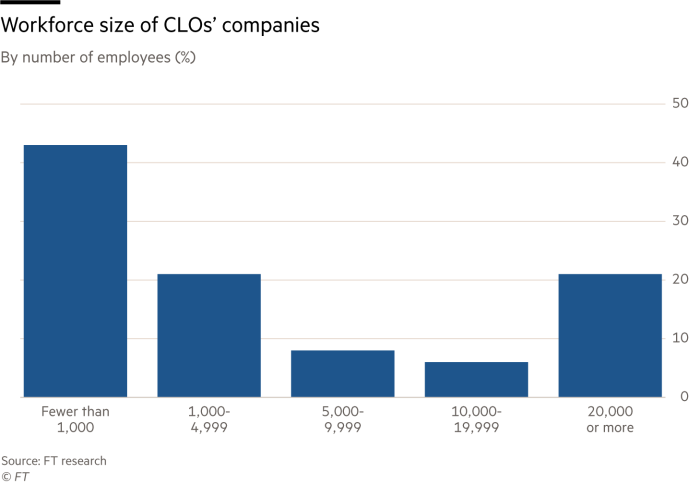
Much more than two-fifths of CLOs ended up from organizations with less than 1,000 workers, with finance, banking, health care and industrial corporations dominating.
Planned price range boosts during 2021 ended up biggest for organizations in Latin The united states and Asia-Pacific, adopted by the US and Canada, then the Middle East and Africa. People in Europe ended up the the very least probably to anticipate progress in paying out on teaching, but nevertheless extra anticipated to boost than minimize expenses this 12 months. All round, the typical anticipated boost was 73 per cent.
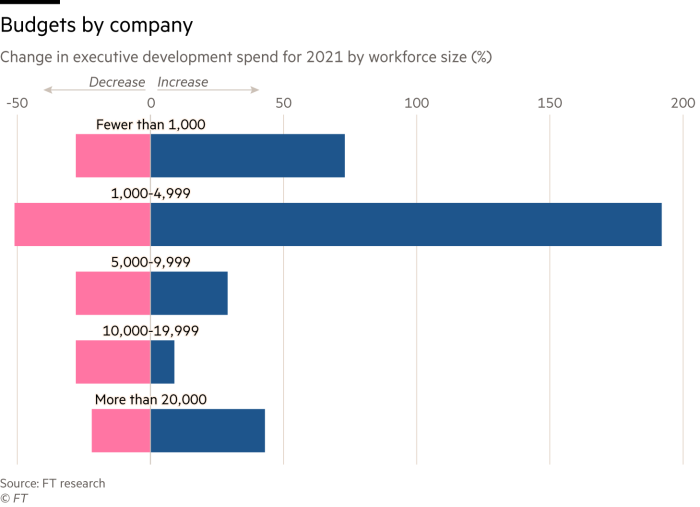
Firms with 1,000-4,999 staff members described the biggest anticipated transform in government teaching expenditure for 2021.
Management was the prime understanding precedence determined for government education, cited as vital by eighty two per cent of respondents. Change management adopted, at 57 per cent. Other longstanding priorities, like digital transformation, tactic and innovation, ended up also rated really by extra than two-fifths of respondents. In a indication of the challenges brought to the fore during the pandemic, the require for teaching all-around resilience, wellbeing and distant or on line collaboration ended up also cited by lots of.
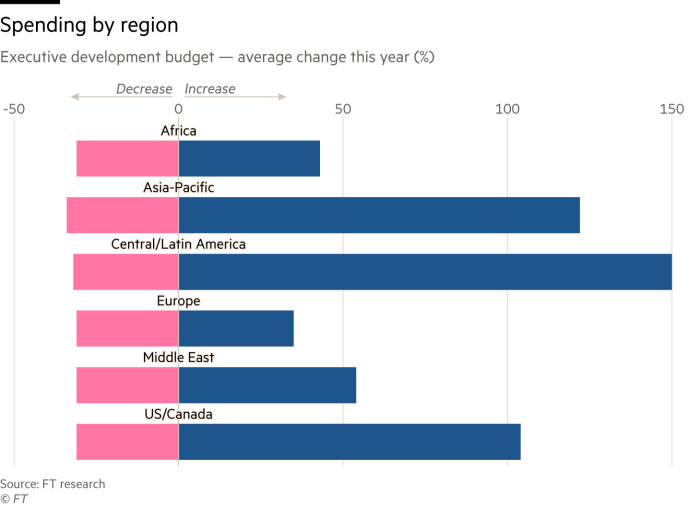
All round, eighty three per cent of chief understanding officers surveyed claimed they prepared to sustain or boost their teaching budgets globally for 2021.
A further rising theme — variety and inclusion — was a superior precedence, cited by 55 per cent, putting it 3rd overall. Among the US respondents, it was however increased — in next location following management. That displays the developing aim on a matter that has mobilised senior managements in current months, brought on partly by the killing of George Floyd final May and the Black Life Matter motion.
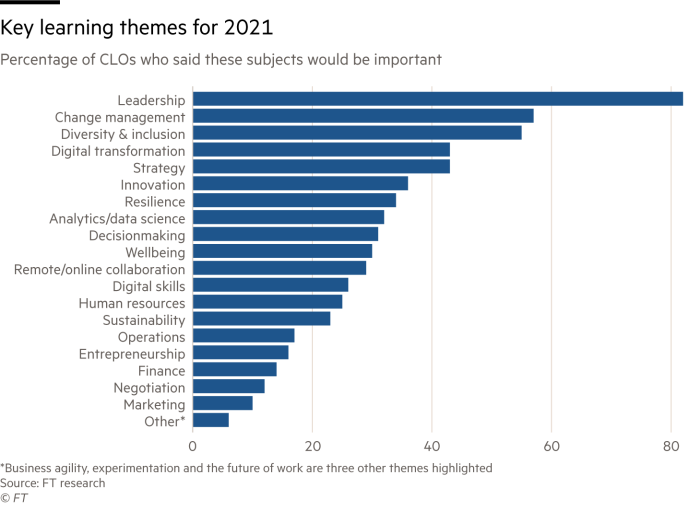
Management, transform management, variety and inclusion and digital transformation are amid the prime priorities to arise in the pandemic.
Enterprise schools can acquire some consolation from the reality that just more than fifty percent of the CLOs surveyed claimed they would convert to universities during 2021 for their government understanding programmes. On the other hand, a more substantial proportion pointed to alternatives: extra than two-thirds claimed they would use inner sources and approximately 3-quarters prepared to use non-college teaching associates.
When CLOs ended up requested to take into consideration the most vital traits of teaching organisations with which they would get the job done, they judged investigation-based mostly and empirical understanding — a single strength of enterprise schools — to be of little relevance. They as a substitute put the biggest emphasis on the price of customisation and an ability to exhibit return on financial commitment. Cutting-edge understanding and a sturdy on line system ended up also really rated.
“People want a thing that targets their require, rather than interesting insights,” claimed a single CLO. “They want short, sharp and participating moments of improvement (lengthy keynotes and time spent passively listening are OUT).” A further claimed: “Virtual understanding has to be participative and to the place, with learners ready to deliver and get the job done on true, recent issues with described, price-additional takeaways.”
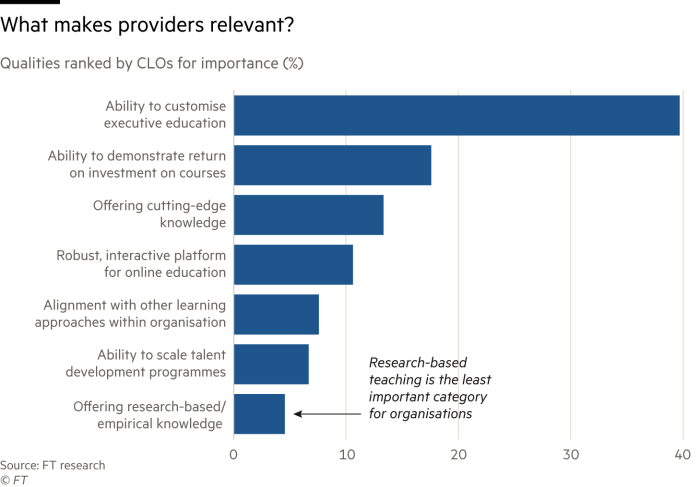
Customisation and return on financial commitment ended up rated increased than conventional enterprise school strengths in investigation-based mostly and empirical understanding.
Lots of CLOs observed a development in the direction of checking out new and extra effective methods to evaluate the price of teaching, with members citing a change from annually to quarterly evaluations, conducting “360” assessments, and using surveys just before and following courses. They pressured the require for ever larger alignment concerning programmes made available and the strategic objectives of their organisation, and for “learning transfer” from members to other staff members.
A person respondent talked about “actionable growth”. A further claimed: “We will be looking for venture- or general performance-based mostly results directly tied to participation in government education.” A 3rd claimed potential teaching programmes would be assessed to “more strictly evaluate and align with the ability to execute and put into action a project”.
Chief understanding officers ended up crystal clear that the hasty swap to on line understanding brought about by Covid-19 lockdowns in 2020 experienced not been attractive, with the extensive the vast majority indicating in-individual understanding was greater. On the other hand, they ended up also sensible about the potential: most predicted a mix of bodily and virtual understanding would be the “new normal”.
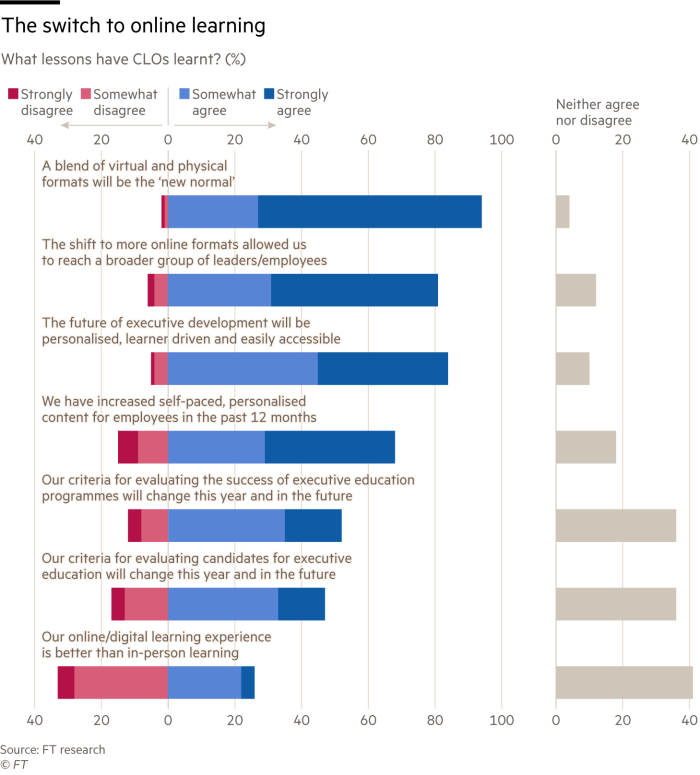
Previous 12 months an enforced shift to on line understanding. Even though CLOs like in-individual instructing, the change brought rewards this kind of as enhanced adaptability.
Much more positively, four-fifths agreed or strongly agreed that digital shipping experienced enhanced adaptability and access to understanding, permitting organizations to arrive at a broader team of leaders and staff members. These views ended up notably potent amid organizations based mostly in Africa and the Middle East, and for more substantial companies with workforces of 20,000-furthermore.
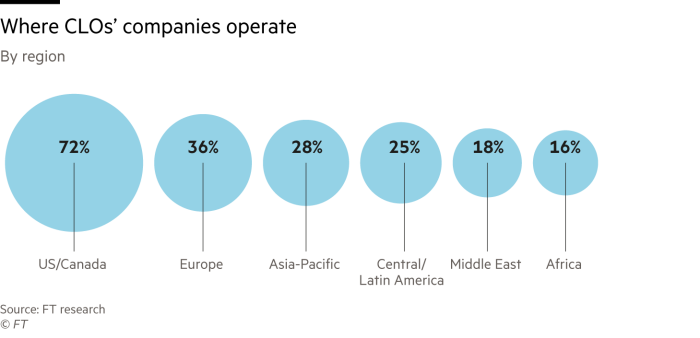
Approximately 3 quarters of surveyed chief understanding officers’ organizations operated in north The united states.
Various CLOs claimed they anticipated a renewed aim on government education, to satisfy a mounting require for new competencies, succession scheduling and locating methods to identify candidates for advertising. “We are moving from seniority-based mostly to ability-based mostly,” claimed a single. Other folks cited a diverse determination for growing teaching that emerged during the pandemic: to motivate and retain vital staff members.
Approximately two-fifths claimed digital understanding experienced enhanced the provision of self-paced and personalised information. Various cited the use of gamification and developing desire in on-demand teaching sources, “micro-learning” in compact models and chunk-sized movie formats. Other respondents claimed there was developing demand for co-procedure and shared understanding with rivals and corporate universities, though 3-fifths claimed assessment and accreditation ended up particularly or incredibly vital in programmes.
All round, 62 per cent of respondents anticipated new designs of collaboration all-around understanding, offering scope for innovation and intensified action by enterprise schools and other vendors. But challenging negotiations lie in advance to provide what CLOs search for. As a single claimed: “[Almost] every thing we have identified is too fluffy, lacks true world information and depth, and has offered nearly zero return on financial commitment.”
Knowledge by Sam Stephens graphics by Chris Campbell

